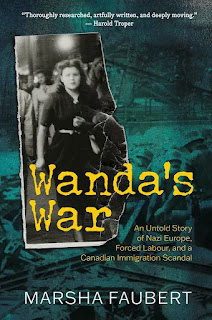Faubert's Wanda's War: An Untold Story of Nazi Europe, Forced Labour, and a Canadian Immigration Scandal (from Goose Lane Editions) explores the lives of her Polish-Canadian mother-in-law and father-in-law, Wanda and Casey (Kazimierz) Surdykowski during and after the Second World War. They left a few photographs, but mostly they did not talk about the war, or their lives in Europe, or coming to Canada.
Wanda's War explores how Wanda survived first the Soviet and then the German invasion of Poland and ended up a forced labourer in a factory camp in Germany. Meanwhile, Casey, then unknown to her, had been seized by the Soviet forces after they invaded eastern Poland in 1939. He was shipped off to serve as a forced labourer in a Siberian forestry camp. From there, he followed a very implausible path (which the book explains) to becoming a soldier in the Polish Division fighting alongside British and Canadians in Italy. My own father, serving in the British Army in Italy, must have been nearby at times; he remembered how everyone felt safer when the Polish Division was nearby, because no German attack was going to get past the Poles.
At the end of the war, both Wanda and Casey became "displaced persons," unwilling and unable to return to Soviet-occupied Poland, unwanted most other places. Wanda reached Canada via a bizarre scheme through which a Canadian businessman was permitted to bring young Polish women from refugee camps to be cheap labour in his factory in rural Quebec. Eventually she fled to southern Ontario, and saw her mother and siblings also reach North America. Casey benefitted from the grudging respect the Western Allies paid to the military service of the Free Polish Army, and was able to join a group of his fellow soldiers being accepted into Canada. He got to Kitchener, Ontario, in the late 1940s, where he met and married Wanda and where they spent the rest of their lives. One of their sons met Marsha Faubert in law school, which is how she became daughter-in-law to Wanda and Casey, who have since died.
They didn't willingly talk about any of their nightmarish wartime history. But Marsha Faubert has pieced together a remarkable amount of information both about them individually and about the world-historical events through which they lived. From family genealogy to pre-war Polish rural society in Eastern Europe, to gulags and slave labour camps, to the military history of World War II, to the intricacies of postwar immigration and adjustment, to the politics of memory, she has got it all in one story.
There's a book launch for Wanda's World tomorrow at Baka Gallery Cafe in Bloor West Village, Toronto. Goose Lane is promoting it on Facebook, so I guess they would not mind if a few of the sophisticated audience of this blog joined in.
A book launch, a real in-person book launch! Imagine.

